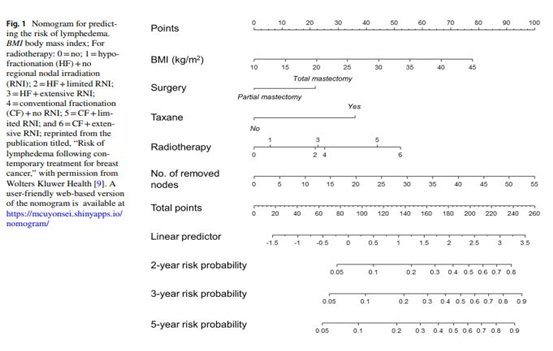글로벌 연구동향
방사선종양학
- [Breast Cancer Res Treat.] Validation of a nomogram for predicting the risk of lymphedema following contemporary treatment for breast cancer: a large multi-institutional study (KROG 20-05)
서울의대, 연세의대 / 변화경, 신경환*, 김용배*,
- 출처
- Breast Cancer Res Treat.
- 등재일
- 2022 Apr
- 저널이슈번호
- 192(3):553-561.
- 내용
Abstract
Purpose: We previously constructed a nomogram for predicting the risk of arm lymphedema following contemporary breast cancer treatment. This nomogram should be validated in patients with different background characteristics before use. Therefore, we aimed to externally validate the nomogram in a large multi-institutional cohort.Methods: Overall, 8835 patients who underwent breast cancer surgery during 2007-2017 were identified. Data of variables in the nomogram and arm lymphedema were collected. The nomogram was validated externally using C-index and integrated area under the curve (iAUC) with 1000 bootstrap samples and by calibration plots.
Results: Overall, 1377 patients (15.6%) developed lymphedema. The median time from surgery to lymphedema development was 11.4 months. Lymphedema rates at 2, 3, and 5 years were 11.2%, 13.1%, and 15.6%, respectively. Patients with lymphedema had significantly higher body mass index (median, 24.1 kg/m2 vs. 23.4 kg/m2) and a greater number of removed nodes (median, 17 vs. 6) and more frequently underwent taxane-based chemotherapy (85.7% vs. 41.9%), total mastectomy (73.1% vs. 52.1%), conventionally fractionated radiotherapy (71.9% vs. 54.2%), and regional nodal irradiation (70.7% vs 22.4%) than those who did not develop lymphedema (all P < 0.001). The C-index of the nomogram was 0.7887, and iAUC was 0.7628, indicating good predictive accuracy. Calibration plots confirmed that the predicted lymphedema risks were well correlated with the actual lymphedema rates.
Conclusion: This nomogram, which was developed using factors related to multimodal breast cancer treatment and was validated in a large multi-institutional cohort, can well predict the risk of breast cancer-related lymphedema.

https://mcuyonsei.shinyapps.io/nomogram/
Affiliations
Hwa Kyung Byun 1 , Jae Sik Kim 2 , Jee Suk Chang 3 , Yeona Cho 3 , Sung-Ja Ahn 4 , Jung Han Yoon 5 , Haeyoung Kim 6 , Nalee Kim 6 , Euncheol Choi 7 , Hyeli Park 8 , Kyubo Kim 9 , Shin-Hyung Park 10 , Chai Hong Rim 11 , Hoon Sik Choi 12 , Yoon Kyeong Oh 13 , Ik Jae Lee 1 , Kyung Hwan Shin 14 , Yong Bae Kim 15
1 Department of Radiation Oncology, Yonsei Cancer Center, Yonsei University College of Medicine, 50-1 Yonsei-ro, Seodaemun-gu, Seoul, 03722, South Korea.
2 Department of Radiation Oncology, Seoul National University Hospital, Seoul National University College of Medicine, 101 Daehak-ro, Jongno-gu, Seoul, 110-744, South Korea.
3 Department of Radiation Oncology, Gangnam Severance Hospital, Yonsei University College of Medicine, Seoul, South Korea.
4 Department of Radiation Oncology, Chonnam National University Hwasun Hospital, Chonnam National University Medical School, Hwasun, South Korea.
5 Department of Surgery, Chonnam National University Hwasun Hospital, Chonnam National University Medical School, Hwasun, South Korea.
6 Department of Radiation Oncology, Samsung Medical Center, Sungkyunkwan University School of Medicine, Seoul, South Korea.
7 Department of Radiation Oncology, Keimyung University Dongsan Hospital, Keimyung University School of Medicine, Daegu, South Korea.
8 Department of Radiation Oncology, Presbyterian Medical Center, Jeonju, South Korea.
9 Department of Radiation Oncology, Ewha Womans University College of Medicine, Seoul, South Korea.
10 Department of Radiation Oncology, School of Medicine, Kyungpook National University, Daegu, South Korea.
11 Department of Radiation Oncology, Korea University Medical College, Seoul, South Korea.
12 Department of Radiation Oncology, Gyeongsang National University School of Medicine and Gyeongsang National University Changwon Hospital, Changwon, South Korea.
13 Department of Radiation Oncology, Chosun University Medical School, Gwangju, South Korea.
14 Department of Radiation Oncology, Seoul National University Hospital, Seoul National University College of Medicine, 101 Daehak-ro, Jongno-gu, Seoul, 110-744, South Korea. shin.kyunghwan@gmail.com.
15 Department of Radiation Oncology, Yonsei Cancer Center, Yonsei University College of Medicine, 50-1 Yonsei-ro, Seodaemun-gu, Seoul, 03722, South Korea. ybkim3@yuhs.ac.
- 키워드
- Breast cancer; Contemporary treatment; Lymphedema; Nomogram.
- 덧글달기









